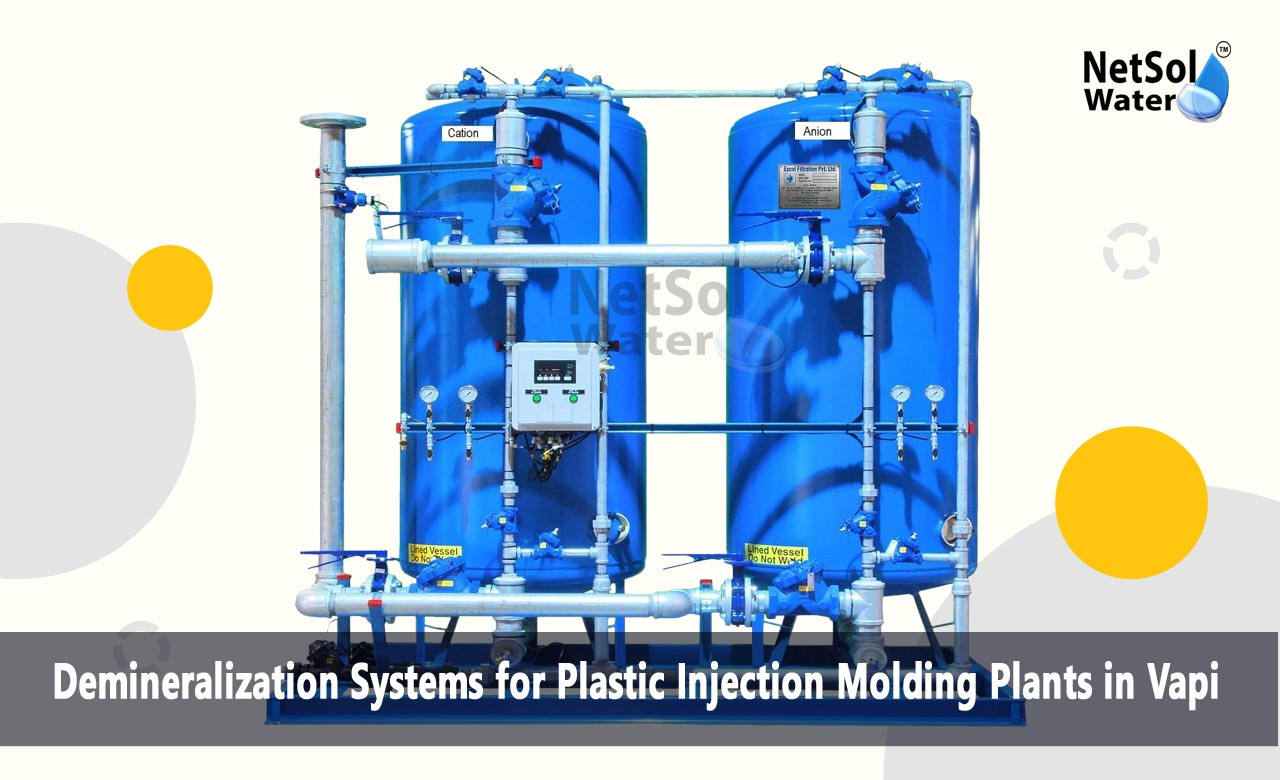Demineralization Systems for Plastic Injection Molding Plants in Vapi
Vapi is located at the core of India’s chemical corridor. The city earns its name from industries that shape plastics and chemicals every day. Plastic injection molding plants here shape components for sectors from automotive to consumer goods. These plants need water free from minerals and salts to prevent damage to molds and machines. Demineralization Systems for Plastic Injection Molding Plants in Vapi deliver pure water that safeguards equipment and improves product quality. Netsol Water stands as the leading DM Plant Manufacturer in Vapi and meets the high standards that this industry demands.
Importance of Demineralization in Plastic Injection Molding Plants
Removing dissolved ions from water remains a key step in maintaining precision in injection molding. Mineral-free water prevents scale formation on pipes and heat exchangers. It also avoids corrosion in stainless steel components that handle high pressure. Let us have a look on some aspects of this process.
Ion Exchange Process
Ion exchange takes calcium, magnesium and other hard ions out of the water. The system passes water through resin beds that swap undesirable ions for hydrogen and hydroxyl ions. That swap produces water with nearly zero conductivity. Such water keeps heated molds free of hard deposits and preserves thermal transfer efficiency.
Mixed Bed Exchange
Mixed beds combine cation and anion resins in a single vessel. This arrangement polishes water to very low conductivity levels. It delivers higher purity than separate beds in series. Molders see a smoother cycle with less chance of scale in narrow cooling channels.
Continuous Demineralization
Continuous exchange systems regenerate one resin bed while another remains in service. The plant avoids downtime that stops production. Continuous operation suits large-scale molding setups that cannot pause for resin regeneration.
Key Features of Demineralization Systems Provided by Netsol Water
A dependable DM Plant Manufacturer in Vapi offers systems with controls that simplify operation and reduce manual oversight. Let us have a look on some features that define high-performance demineralization units.
High Resin Capacity
Larger resin beds require fewer regenerations. Operators enjoy longer service runs and lower chemical use. That capacity matches the demands of continuous molding lines in Vapi’s industrial zone.
Automatic Regeneration Control
Sensors monitor water conductivity and trigger resin regeneration only when needed. Automation removes guesswork from maintenance schedules. Personnel can focus on core production tasks instead of plant checks.
Compact Design
Systems that occupy less floor space suit crowded plant floors. Compact modules fit alongside injection machines. They integrate easily into existing utility areas without major layout changes.
Safety Mechanisms
Overpressure protectors and leak sensors keep plant safety on guard. Built-in alarms alert teams to any system anomaly. Netsol Water installs these features as a standard in every project.
Benefits of Demineralized Water in Plastic Injection Molding
Pure water flows translate into stronger consistency in molded parts and lower operating costs. Let us have a look on some of these advantages.
Improved Mold Longevity
Demineralized water stops scale from building on mold cores and cavities. Molds last longer and demand fewer repairs. This reliability reduces downtime and production disruptions.
Better Surface Finish
When cooling jackets remain free of deposits, molds maintain uniform temperature. Parts cure evenly and show smoother surfaces. Manufacturers can meet strict quality standards without extra polishing steps.
Reduced Downtime
Fewer resin regenerations and less frequent cleaning keep molding lines running. Plants avoid the cost of unscheduled stops that eat into production capacity.
Lower Energy Use
Clean heat transfer surfaces require less power to reach target temperatures. Pumps and heaters run more efficiently when water lacks mineral scale. Energy savings add up over large production runs.
Maintenance Practices for Demineralization Systems
Even the best systems demand careful attention to preserve performance and water quality. Let us have a look on some best practices that operators should follow.
Regular Resin Monitoring
Checking resin health with conductivity tests prevents breakthrough events. Operators schedule resin replacement before water purity declines.
Timely Regeneration
Following manufacturer-recommended regeneration cycles ensures resin capacity remains high. Delaying regeneration risks sudden shifts in water quality.
Water Quality Testing
Pulling samples at system outlets confirms that demineralization meets specifications. Tests for conductivity and total dissolved solids show when adjustments or resin changes become necessary.
Scheduled Servicing
Annual inspections of valves, pumps and controls catch wear before it leads to leaks or failures. A proactive maintenance plan keeps demineralization plants in top working order.
Conclusion
This overview highlights how demineralization systems for plastic injection molding plants in Vapi protect equipment and improve product quality. Netsol Water takes the lead as the DM Plant Manufacturer in Vapi with tailored solutions that match local water profiles and production scales. For expert guidance on selecting or upgrading a DM plant contact Netsol Water today. Request a consultation to explore how pure water can enhance your molding process and lower your operating costs.
Contact Netsol Water at:
Phone: +91-9650608473, Email: enquiry@netsolwater.com



